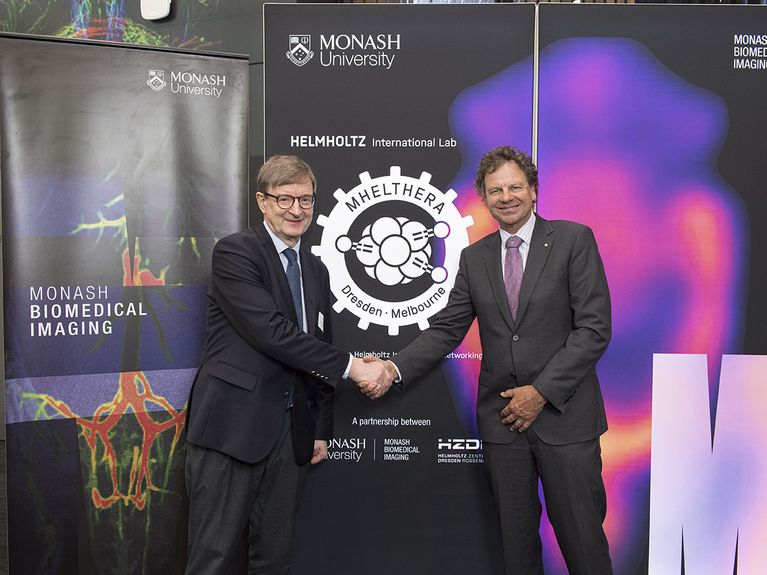
Story #11
Research Across Borders – for Joint Solutions
Whether it’s the energy transition, climate change, or the fight against epidemics: the greatest global challenges of our time can only be overcome by working together. Accordingly, Helmholtz collaborates with leading research centers from around the world, while its offices in Brussels, Peking and Tel Aviv strengthen international research partnerships.
Pursuing research across borders is part of our daily work: in our projects, we not only combine expertise from various disciplines, but also collaborate with experts from around the globe. Each year, more than 14,500 scientists from abroad visit our research centers to take advantage of our unique palette of resources, e.g. supercomputers, particle accelerators, light sources, and high-tech labs. Further, we are key contributors to other internationally operating research infrastructures in Germany and abroad, e.g. the X-ray laser European XFEL at DESY, and the European Spallation Source in Lund, which Forschungszentrum Jülich helped to develop. These resources are powerful magnets for international collaboration.
Within the six main Helmholtz research areas, our Centers maintain hundreds of individual partnerships with research institutes in every corner of the world. Major missions like MOSAiC can only be achieved together with international partners. Helmholtz has established a range of resources to support our Centers in this regard – like the Initiative and Networking Fund (IVF), which has supported more than 140 international research projects and nearly 300 researchers from around the world through individual exchange and mobility programs since 2007. And through the Helmholtz International Research Groups and Helmholtz International Research Networks, we have laid the groundwork for long-term strategic partnerships between our Centers and prestigious institutes in e.g. France, Sweden and Israel. One particularly appealing and successful format: the Helmholtz International Research Schools. Together with partners from e.g. the USA, Canada and Argentina, our Centers offer joint graduate schools on topics like water security, diabetes research, and astroparticle physics.
Research collaborations within Europe are especially close to our hearts. Many of the questions Europe is now confronted with are simply too large for any EU Member State to tackle on its own. Our Brussels office, founded in 2002, allows us to more clearly and actively shape the European research landscape and research policy. It also establishes new networks and offers consulting for our Centers. In this way, we help ensure that future-relevant topics are addressed in Europe, and that our experts can optimally take part in European research programs. And the success of this approach speaks for itself: in 2024, Helmholtz, with total funding of 848 million euros, came in first in the Horizon Europe statistics, followed by our valued French partner organization CNRS. In addition, since 2018 our funding program Helmholtz European Partnering has worked to promote solidarity on the European research landscape as part of the IVF fund. The ten sponsored projects, implemented with partner institutes in Bulgaria, Croatia, Greece, Italy, Malta, Slovenia and Spain, make major contributions to the further development of local research systems.
Picture: Monash University, Australia
Participating centers
- AWI
Alfred Wegener Institute, Helmholtz Centre for Polar and Marine Research
- CISPA
CISPA Helmholtz Center for Information Security
- DESY
Deutsche Elektronen-Synchrotron DESY
- Jülich
Forschungszentrum Jülich
- Geomar
GEOMAR Helmholtz Centre for Ocean Research Kiel
- GSI
GSI Helmholtzzentrum für Schwerionenforschung
- DLR
German Aerospace Center
- DKFZ
German Cancer Research Center
- DZNE
German Center for Neurodegenerative Diseases
- UFZ
Helmholtz Centre for Environmental Research – UFZ
- HZI
Helmholtz Centre for Infection Research
- HZB
Helmholtz-Zentrum Berlin für Materialien und Energie
- HZDR
Helmholtz-Zentrum Dresden-Rossendorf
- Hereon
Helmholtz-Zentrum Hereon
- KIT
Karlsruhe Institute of Technology
- MDC
Max Delbrück Center